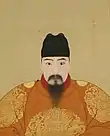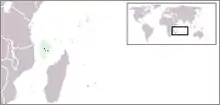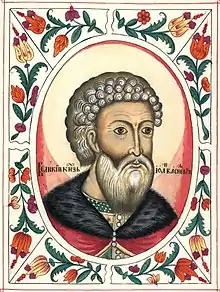1505
Year 1505 (MDV) was a common year starting on Wednesday (link will display the full calendar) of the Julian calendar.
| Millennium: | 2nd millennium |
|---|---|
| Centuries: | |
| Decades: | |
| Years: |
| 1505 by topic |
|---|
| Arts and science |
|
| Leaders |
|
| Birth and death categories |
| Births – Deaths |
| Establishments and disestablishments categories |
| Establishments – Disestablishments |
| Works category |
|
| Gregorian calendar | 1505 MDV |
| Ab urbe condita | 2258 |
| Armenian calendar | 954 ԹՎ ՋԾԴ |
| Assyrian calendar | 6255 |
| Balinese saka calendar | 1426–1427 |
| Bengali calendar | 912 |
| Berber calendar | 2455 |
| English Regnal year | 20 Hen. 7 – 21 Hen. 7 |
| Buddhist calendar | 2049 |
| Burmese calendar | 867 |
| Byzantine calendar | 7013–7014 |
| Chinese calendar | 甲子年 (Wood Rat) 4201 or 4141 — to — 乙丑年 (Wood Ox) 4202 or 4142 |
| Coptic calendar | 1221–1222 |
| Discordian calendar | 2671 |
| Ethiopian calendar | 1497–1498 |
| Hebrew calendar | 5265–5266 |
| Hindu calendars | |
| - Vikram Samvat | 1561–1562 |
| - Shaka Samvat | 1426–1427 |
| - Kali Yuga | 4605–4606 |
| Holocene calendar | 11505 |
| Igbo calendar | 505–506 |
| Iranian calendar | 883–884 |
| Islamic calendar | 910–911 |
| Japanese calendar | Eishō 2 (永正2年) |
| Javanese calendar | 1422–1423 |
| Julian calendar | 1505 MDV |
| Korean calendar | 3838 |
| Minguo calendar | 407 before ROC 民前407年 |
| Nanakshahi calendar | 37 |
| Thai solar calendar | 2047–2048 |
| Tibetan calendar | 阳木鼠年 (male Wood-Rat) 1631 or 1250 or 478 — to — 阴木牛年 (female Wood-Ox) 1632 or 1251 or 479 |
Events
January–June
- June 6 – The M8.2–8.8 Lo Mustang earthquake strikes Nepal, causing severe damage in Kathmandu, western Nepal, and some parts of the Indo-Gangetic plain.[1]
- June 19 – Zhengde Emperor ascends the throne of Ming Dynasty China.
- June 27 – The future King Henry VIII of England repudiates his engagement to Catherine of Aragon, at his father's command.[2]
July–December
- July 2 – Martin Luther, aged 22, vows to become a monk in a moment of terror, as a result of a close lightning strike during a thunderstorm, near the village of Stotternheim.[3]
- July – The Kalmar Bloodbath takes place in Kalmar, Sweden.
- July 17 – Luther enters the monastic life, at an Augustinian cloister in Erfurt.
- July 24 – Travelling to India, a group of Portuguese explorers sack the city-state of Kilwa in East Africa, killing the king for failing to pay tribute.
- November 6 – Vasili III succeeds Ivan III, as Grand Prince of Muscovy.
- December 30 – Érard de La Marck is elected prince-bishop of Liège.[4]
Date unknown
- A Portuguese fleet attacks Kilwa, and then Mombasa. The Portuguese then attempt to monopolize the trade in the east African ports, but are unable to maintain control (by the late 16th century, Swahili groups regain control of several ports from the Portuguese).
- Portuguese merchants establish factories on the east coast of Africa.
- Portuguese explorers under Dom Lourenço d'Almeida reach Colombo on Sri Lanka and send envoys to the King of Kotte; they also reach the Comoros.
- Bermuda is discovered by Spanish explorer Juan de Bermúdez.
- King Alexander of Poland signs the Nihil novi Act, making Poland a Nobles' Democracy.
- Poland prohibits peasants from leaving their lands, establishing serfdom.
- Christ's College, Cambridge, England, is re-founded, receiving its charter from Lady Margaret Beaufort.
- Judah Abravanel becomes personal physician to the viceroy of Naples.
- Battle of Achnashellach in Scotland: The Clan Cameron emerges victorious over several other clans.
- Watch 1505, the earliest known pocket watch, is made at Nuremberg, Germany by Peter Henlein.[5]
- 1505 (or 1506) – Portuguese explorer Gonçalo Álvares is the first to sight what will later be known as Gough Island in the South Atlantic.
Births
- January 12 – Louis, Count of Stolberg, German nobleman (d. 1574)
- January 13 – Joachim II Hector, Elector of Brandenburg, Imperial Elector (d. 1571)
- February 4 – Mikołaj Rej, Polish poet and prose writer, politician and musician of the Renaissance (d. 1569)[6]
- February 5 – Aegidius Tschudi, Swiss historian (d. 1572)
- March 16 – Francisco Balbi di Correggio (d. 1589)[7]
- March 25 – Elizabeth Grey, Viscountess Lisle, English heiress (d. 1519)
- May 20 – Levinus Lemnius, Dutch writer (d. 1568)
- September 15 – Mary of Hungary, Dutch ruler (d. 1558)
- September 23 – Anne de Laval, Viscountess of Thouars, French noblewoman and nominal pretender to the Kingdom of Naples (d. 1554)
- November 3 – Achilles Gasser, German physician and astrologer (d. 1577)
- November 23 – Ercole Gonzaga, Spanish Catholic cardinal (d. 1563)
- December 18 – Philipp von Hutten, German explorer (d. 1546)
- December 21 – Thomas Wriothesley, 1st Earl of Southampton, English politician (d. 1550)[8]
- December 25 – Christine of Saxony, German noble (d. 1549)
- date unknown
- probable
Deaths

Saint Jeanne de Valois

Emperor Hongzhi

Blessed Osanna of Mantua
- February 4 – Jeanne de Valois, French princess, Roman Catholic nun and saint (b. 1464)[10]
- February 19 – Matilda of Hesse, German noblewoman (b. 1473)
- February 20 – Arvid Trolle, Swedish politician (b. 1440)
- March 5 – Philip of Cleves, Bishop of Nevers, Amiens, Autun (b. 1467)
- March 29 – Sidonie of Bavaria, eldest daughter of Duke Albrecht IV of Bavaria-Munich (b. 1488)
- April 23 – Muhammad Jaunpuri, Indian-born religious leader (b. 1443)
- May 28 – Ascanio Sforza, Italian Roman Catholic cardinal (b. 1455)[11]
- June 8 – Hongzhi Emperor of China (b. 1470)
- June 18 – Osanna of Mantua, Italian Dominican tertiary and blessed (b. 1449)
- June 15 – Ercole I d'Este, Duke of Ferrara, Italian politician (b. 1431)
- July – Jacob Obrecht, Flemish composer (plague) (b. 1457)[12]
- October 27 – Emperor Ivan III of Russia (b. 1440)
- date unknown
References
- Harsh K. Gupta; Fareeduddin (2008). Recent Advances in Earth System Science. Geological Society of India. pp. 244, 381. ISBN 978-81-85867-83-0.
- Susan Doran (2008). The Tudor Chronicles. Quercus. p. 1496. ISBN 978-1-84724-422-2.
- Edward J. Hahnenberg (April 12, 2005). Table Talk with Martin Luther: A Modern Catholic's Conversations with the Founder of Protestantism. p. 11. ISBN 978-1-4634-9168-0.
- Peter G. Bietenholz; Thomas Brian Deutscher (January 1, 2003). Contemporaries of Erasmus: A Biographical Register of the Renaissance and Reformation. University of Toronto Press. p. 383. ISBN 978-0-8020-8577-1.
- Peter Henlein: Watch 1505 - HR Fernsehen (German), hr-fernsehen, German. Retrieved 2018-12-30.
- Gorton Carruth (1993). The Encyclopedia of World Facts and Dates. HarperCollins. p. 229. ISBN 978-0-06-270012-4.
- Albert Ganado; Maurice Agius-Vadalà; George Mifsud Chircop (1994). A Study in Depth of 143 Maps Representing the Great Siege of Malta of 1565. Bank of Valletta. p. 321. ISBN 978-99909-0-050-7.
- The Encyclopedia Americana. Americana Corporation. 1976. p. 334. ISBN 978-0-7172-0107-5.
- Stanford E. Lehmberg (July 14, 2014). The Reformation of Cathedrals: Cathedrals in English Society. Princeton University Press. p. 211. ISBN 978-1-4008-5980-1.
- Emily Sarah Holt (1861). Memoirs of Royal Ladies. Hurst and Blackett. p. 270.
- George Haydn Huntley (1971). Andrea Sansovino, Sculptor and Architect of the Italian Renaissance. Greenwood Press. p. 58. ISBN 978-0-8371-5609-5.
- Martin Picker (1988). Johannes Ockeghem and Jacob Obrecht: A Guide to Research. Garland Pub. p. 49. ISBN 978-0-8240-8381-6.
- Burkhalter, A. Louis; Romain Goldron (1968). Music of the Renaissance. H. S. Stuttman Company. p. 87.
This article is issued from Wikipedia. The text is licensed under Creative Commons - Attribution - Sharealike. Additional terms may apply for the media files.

%252C_Queen_of_Hungary.jpg.webp)
